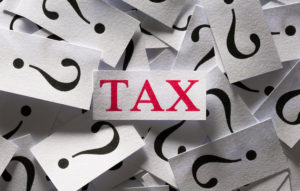 Lots to Think About Vis-a-Vis Taxes
Lots to Think About Vis-a-Vis Taxes
The 2017 Joint Committee on Assessment and Taxation met for a day and a half this week to gather information that may guide the work of the 2018 Legislature as they continue to grapple with tax policy.
The Committee members are Rep. Steven Johnson, Chair (R-Assaria), Sen. Caryn Tyson, Vice-chair (R-Lousiburg), Senators Tom Holland (D-Baldwin City) and Dan Kerschen (R-Garden Plain) and Representatives Ken Corbet (R-Topeka), Tom Sawyer (D-Wichita), and Kristey Williams (R-Augusta).
They started by reviewing how tax collections have been going since the passage of SB 30, the bill rescinding the Brownback tax plan. It was noted that while things are looking better – income tax collections are trending upward as are sales tax collections – it was too early to see what the ultimate impact might be. Staff repeatedly told the committee that they would have a much better view once income taxes are filed in April.
Another issue examined was the impact of economic development incentive programs (STAR bonds, PEAK, and HPIP) and how effective Kansas is in analyzing the impact of these credits and incentives. The three eco-devo programs listed above resulted in a diversion of $121 million/year from the state general fund. A study by the Legislative Post Audit Division found that Kansas, unlike our neighbors in Oklahoma, Nebraska, Colorado, and Missouri, has no program in place for measuring the impact of such programs or ensuring that lawmakers understand and act upon the analysis of these programs. Members of the committee expressed interest in improving in this area.
The sales tax was examined for a number of issues. One is the enormous list of sales tax exemptions in state law. Many of those exemptions are required by the federal government or are there to prevent double taxation but it was noted that perhaps Kansas has been too generous in granting additional exemptions. The impact of internet sales on sales tax collections in Kansas was also studied. The US Supreme Court ruled a number of years ago that states could not impose the tax on companies that did not have a physical presence in the state. A number of states, including Kansas, have tried to persuade Congress to take action on this issue to no avail. Currently, there are efforts in other states, notably South Dakota and Massachusetts to find other ways to solve this issue. Technological advances since the initial Supreme Court ruling have made it easy for vendors to charge and remit destination based sales taxes.
The other big issue discussed was the property tax lid passed by the legislature. Under the lid, cities and counties are unable to increase property tax collections beyond the rate of inflation without a vote of the electorate. This has tied the hands of city and county commissioners as they try to deal with local needs and in particular the cost of employee health benefits. Sen. Tyson went on the offense against representatives of cities and counties alleging that they were not following the cap. A Douglas County resident had complained to her that property taxes went up by 10%.
What these legislators fail to understand is that some things are exempt under the lid (public safety) and that the lid does not apply to USD’s. Lawrence USD 497 in Douglas County, for example, passed a large bond issue and had to raise collections under their LOB based on changes in the finance formula. It makes sense that in some places property taxes would still increase overall beyond the CPI limit.
Committee staff will now prepare a report of their findings to go to the Senate and House Tax Committees as the 2018 session starts.
Senator Dennis Pyle Wants to Subvert the Court
Senator Dennis Pyle (R-Hiawatha) who is not known for supporting public education, has proposed a measure to strip the Supreme Court of any authority that would force the legislature to suitably fund public education in Kansas.
The Court, in the Gannon School Finance Decision, said they were no longer going to be party to continuing an unconstitutional system of funding. This has been widely interpreted to mean that if the legislature does not fix the school finance system such that it is both adequately and equitably financed, then the Court would prohibit distribution of funds to schools in an unconstitutional system. Schools would close until the formula was constitutional.
This threat is the only thing that will force the Legislature to move to fix the system. Without the ability to block the funding and close schools, the Legislature can feel free to ignore the Court decision.
Pyle’s proposal would be a constitutional amendment that must get a 2/3 super-majority vote in both the House and Senate and then be approved by the voters. He wants this fast-tracked so it could beat the Supreme Court’s April 30 deadline for briefs on whatever the Legislature passes this year. And if Senator Pyle remains true to form, he won’t support anything that solves the funding issue.
Click here to read the KC Star’s reporting on the Pyle proposal.


